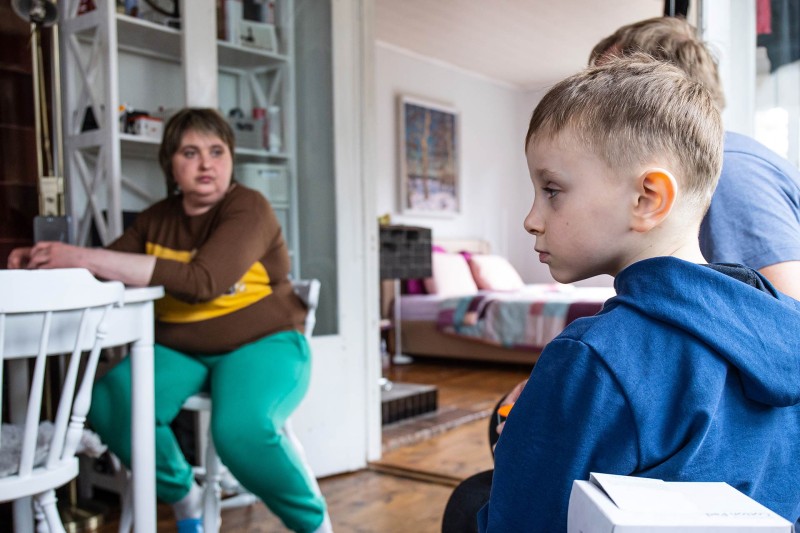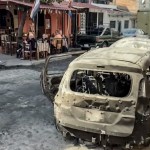Since Russia’s invasion of Ukraine, over a million Ukrainian citizens have been taken to Russian territory.
Similar figures have been cited by both governments. Where they differ is the interpretation: While the Russians call them voluntary evacuations in the interests of safety, Ukraine says its citizens are being forcibly deported in violation of the Geneva Conventions.
Researchers and human rights groups have been unable to make independent assessments, though sporadic reports of involuntary deportations have appeared in the media.
To get a clearer picture, OCCRP’s Ukrainian member center Slidstvo.info spoke with ten people who were taken to Russia, almost all from the occupied southeastern city of Mariupol.
As the Russians advanced on the city this spring, aircraft and artillery blanketed it with daily shelling that left entire neighborhoods uninhabitable and killed thousands. Families cowered for weeks in damp basements with hardly any food or water.
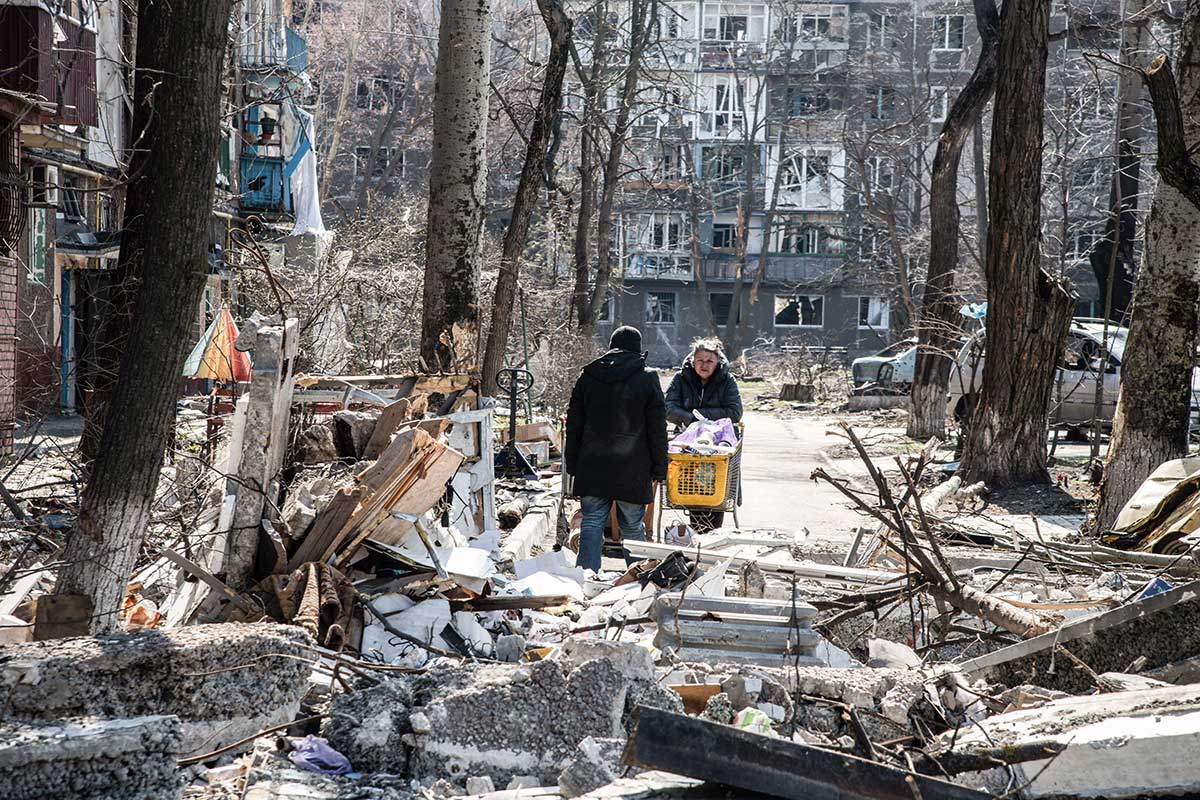 Residents of Mariupol stock up on supplies in a bombed-out neighborhood in early April. (Photo: Maximilian Clarke/SOPA Images via ZUMA Press Wire)
Residents of Mariupol stock up on supplies in a bombed-out neighborhood in early April. (Photo: Maximilian Clarke/SOPA Images via ZUMA Press Wire)
Once home to over 430,000 people, Mariupol now has less than a quarter of that number. Petro Andryushchenko, an adviser to the mayor, claims that many were sent to Russia against their will.
"It would be ‘voluntary’ if they had a choice,” he told Slidstvo.info. “Or if they went to Russia and could then return to territory controlled by Ukraine. Since there was no choice, we believe it’s coercion.”
Accounts from refugees themselves supported his statement. Several told reporters that deportations began before the city was even fully occupied.
On their way east, the deportees described a series of interrogations and so-called “filtering procedures.” They say Russian officials took their fingerprints, examined their bodies for pro-Ukrainian tattoos, and searched their mobile phones before sending them on toward Russia, often separating them from their loved ones.
Once they arrived in Russia, traumatized and exhausted from days of deprivation, several described a reception by Russian emergency workers and charities that made them feel they had become the subject of pro-regime propaganda. A number of non-military agencies — including the security services, the police, and the emergencies ministry — took part in these procedures. Even the Russian Orthodox Church has played a role in receiving them.
Some of these deportees later managed to escape, but many remain in Russia, left to an uncertain fate.
The Ukrainians interviewed for this story have been identified only by their first names, or pseudonyms, to protect their relatives who are still in Russia or occupied territory.
The Basements of Mariupol
To survive the assault on their city, Mariupol’s residents crowded into bomb shelters and basements, where some spent weeks while hardly setting foot outside.
“The hardest thing was the water, we had practically none,” said Olena, who sheltered with her nine-year-old daughter and mother, along with other families, in the basement of a local kindergarten. “We got water from the boilers and really limited the children. We gave them just half of a little bottle at a time.”
In fear of shelling, “we didn’t let the children out,” she said. “They sat in the darkness for a month.”
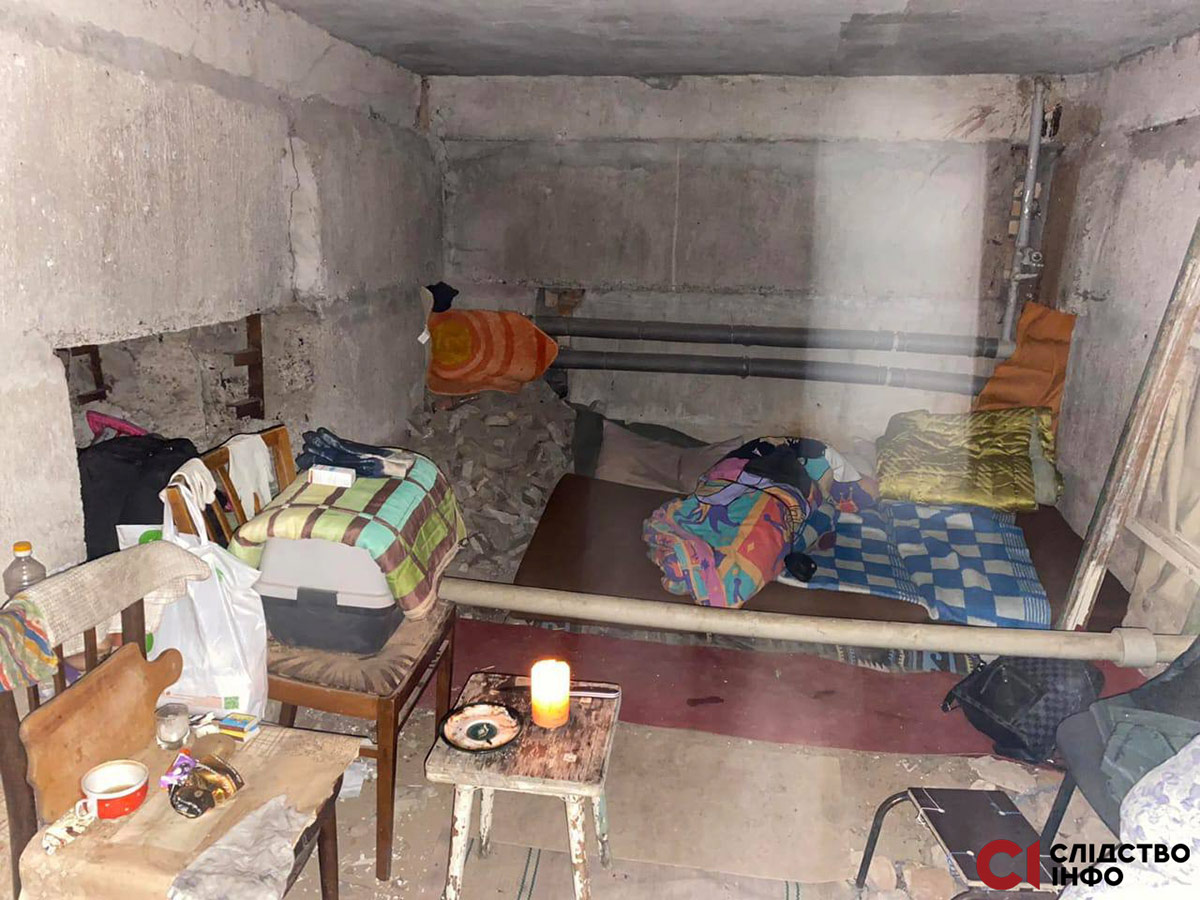 A basement used for shelter by Mariupol residents. (Photo: Slidstvo.info)
A basement used for shelter by Mariupol residents. (Photo: Slidstvo.info)
With no gas or electricity, those in hiding had to scrounge food from ruined markets and cook on open fires just outside their hiding places. But the danger of bombardment was ever-present.
Another woman, Vira, told of a blast that killed her neighbor and tore off his four-year-old son’s arm. “We buried the father in the park behind the house,” she said. “Everyone was buried there.”
Despite fierce Ukrainian resistance, by mid-March the Russians were moving into the city. Some residents escaped to Ukrainian-held territory in the west, but the journey was treacherous, punctuated by Russian shelling that repeatedly forced evacuations to a halt and that the Ukrainian government described as targeting civilian cars and buses.
For those who could not escape to the west, one option was to go to Port City, a shopping mall in central Mariupol, where occupying authorities organized an evacuation to Russia.
Many of those who preferred to stay in their shelters say they were forced or coerced into making the journey.
Lina, in hiding with her 15-year-old daughter and 82-year-old grandmother, recalled some neighbors taking advantage. But she and her family didn’t want to leave, she said. “Especially to Russia. Especially when they’re throwing bombs.”
When their building was shelled and set alight on March 24, they ran outside and hid in a chicken coop. That was when they first encountered the occupiers.
“We heard voices. Our neighbor had stayed in the building with her disabled mother. And someone shouted: ‘Who’s in the basements, come out! We’ll throw a grenade!’ We heard no answer — and then a grenade explosion.”
“Of course we had to come out. We said, ‘We’re here, don’t throw anything.’ They said we had to leave.”
Lina said she pleaded with the soldiers to let her go see her mother, who was living in another part of Mariupol. They refused, telling her that the district was being “cleansed” and that “we’re going to wipe everything off the face of the earth,” she said.
Instead, she and her family had to go on a six-kilometer trek through several villages, and were then placed on a bus that brought them deeper into the separatist-controlled Donetsk People’s Republic (DNR). Buildings there were marked with the letter “Z,” a symbol of support for the Russian invasion, she said, while bearded soldiers she assumed were Chechens patrolled the streets.
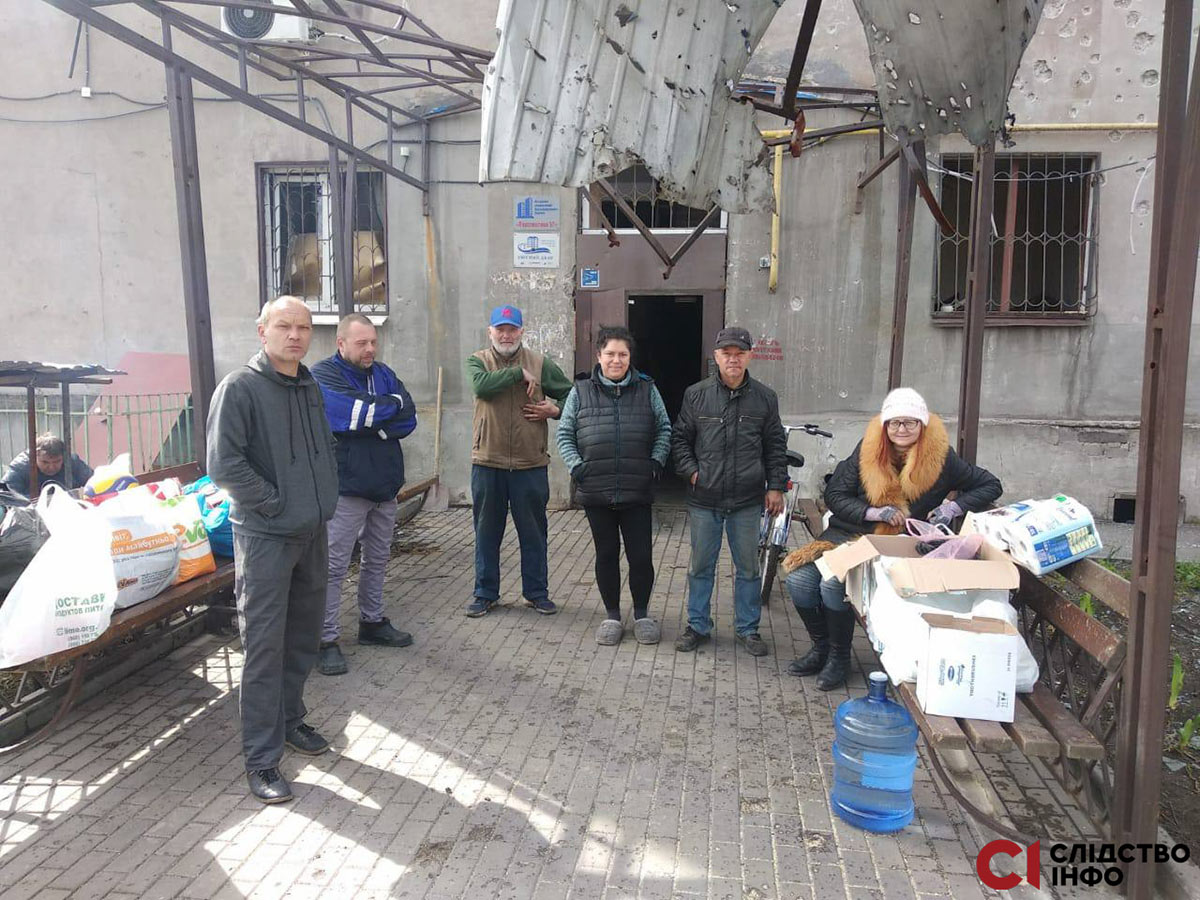 Several Mariupol residents near a damaged building. (Photo: Slidstvo.info)
Several Mariupol residents near a damaged building. (Photo: Slidstvo.info)
Olena, the woman who hid in a kindergarten, also recalled encountering Chechen soldiers, who she said she could identify from their broken Russian.
They ordered her and the others to leave the city, which they were told was about to be “cleansed” of Ukrainian soldiers. But they received assurances they could return within days. “You don’t even need to take your things,” the soldiers said.
Olena’s mother asked to be allowed to help her elderly mother, who couldn’t see or walk well and was alone in a nearby apartment. But the Russians refused. Chilled by rumors of soldiers shooting civilians in the legs for refusing to give up their phones, she did not object.
“We were in some kind of stupor,” she said.
Still, she said, they managed to hide their SIM cards. “We were ready to give them everything, but not our SIM cards. So that we could be in touch with our loved ones.”
Before she could say goodbye to her grandmother, the Russians formed a corridor of soldiers and led them towards the sea.
Vira, who had helped bury her neighbor in a park, went on her own journey out of Mariupol, managing to make it to Ukrainian territory in the west.
“We didn’t know about any humanitarian corridors, because we had no reception,” she said. “So we went on our own. It was frightening. There were so many corpses on the road that we blindfolded our children. Things kept exploding and the kids were screaming. We prayed the Lord’s Prayer because aside from God there was no one to help us.”
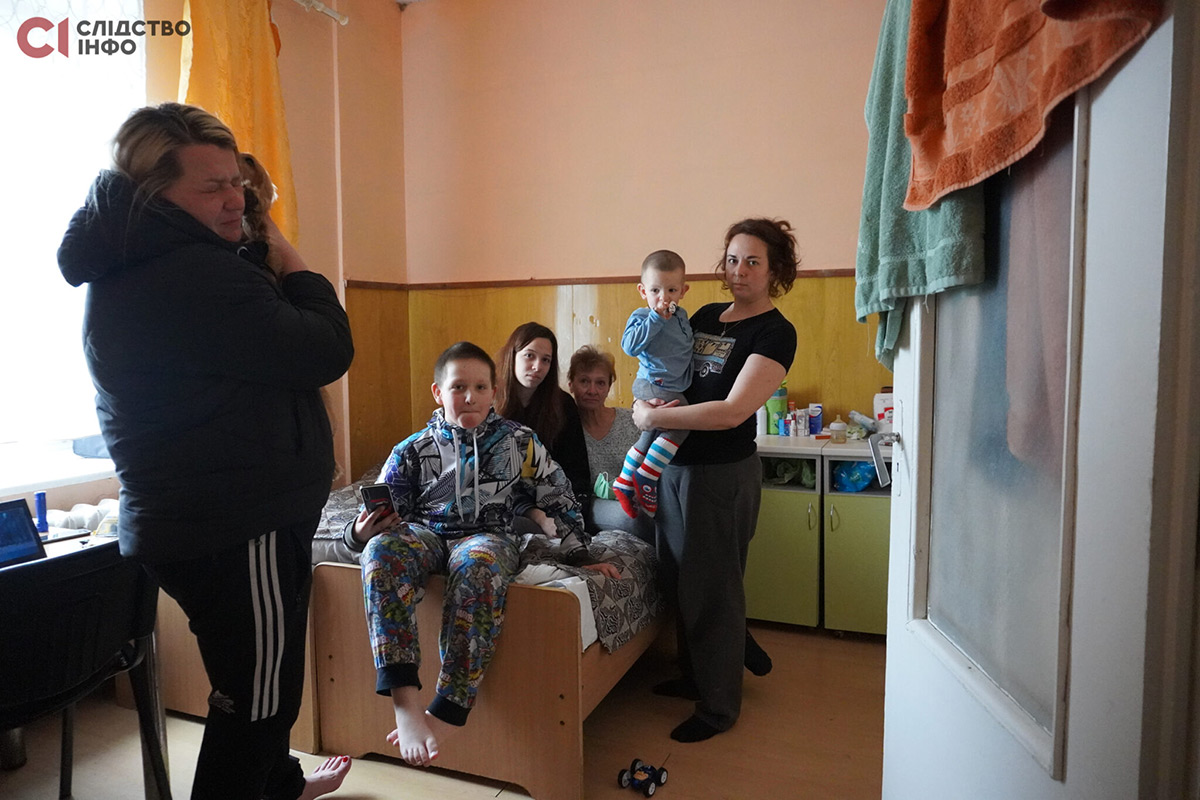 Vira and her family. (Photo: Slidstvo.info)
Vira and her family. (Photo: Slidstvo.info)
‘I Was More Comfortable in the Basement’
But for many in Mariupol, heading to the east was the only option. After falling into Russian hands, they underwent a so-called “filtering” procedure. Their bodies were inspected for tattoos, their phones were checked, and they were questioned about ties to the Ukrainian military or other armed groups.
Vladyslav, an actor with the Mariupol Drama Theater, recalled being taken away shortly after the building was struck by a bomb that killed hundreds on March 16.
“They undressed me, looked at my knees, elbows, and my collarbone. Then they saw that there was nothing [suspicious] and let me get dressed. They took my godson’s phone and checked all his messages, all his apps, and asked him who he was chatting with.”
 Vladyslav in a headshot from before the war. (Photo: Slidstvo.info)
Vladyslav in a headshot from before the war. (Photo: Slidstvo.info)
Such inspections became more systemic in so-called filtration camps that were set up in several cities on DNR territory. The Mariupol evacuees passed through several of these overcrowded facilities, the largest of which was in Bezimenne, a coastal village on the way to the Russian border.
There, they were housed in schools and community centers to await further distribution.
Olena, who had hid in the kindergarten basement, was among those who passed through Bezimenne. She recalls seeing over 1,000 people undergoing this first step of filtration. She and her family waited six days before they were finally taken further.
“You wouldn’t believe it, but I was more comfortable in that basement, because I knew what could happen next,” she said. “Here I didn’t know … where I’d be taken next, and when it would be.”
She was allowed to walk around the city, but when she asked DNR police whether she and her family could go onward to the next camp themselves, they said no and told her she was undergoing an “organized evacuation.”
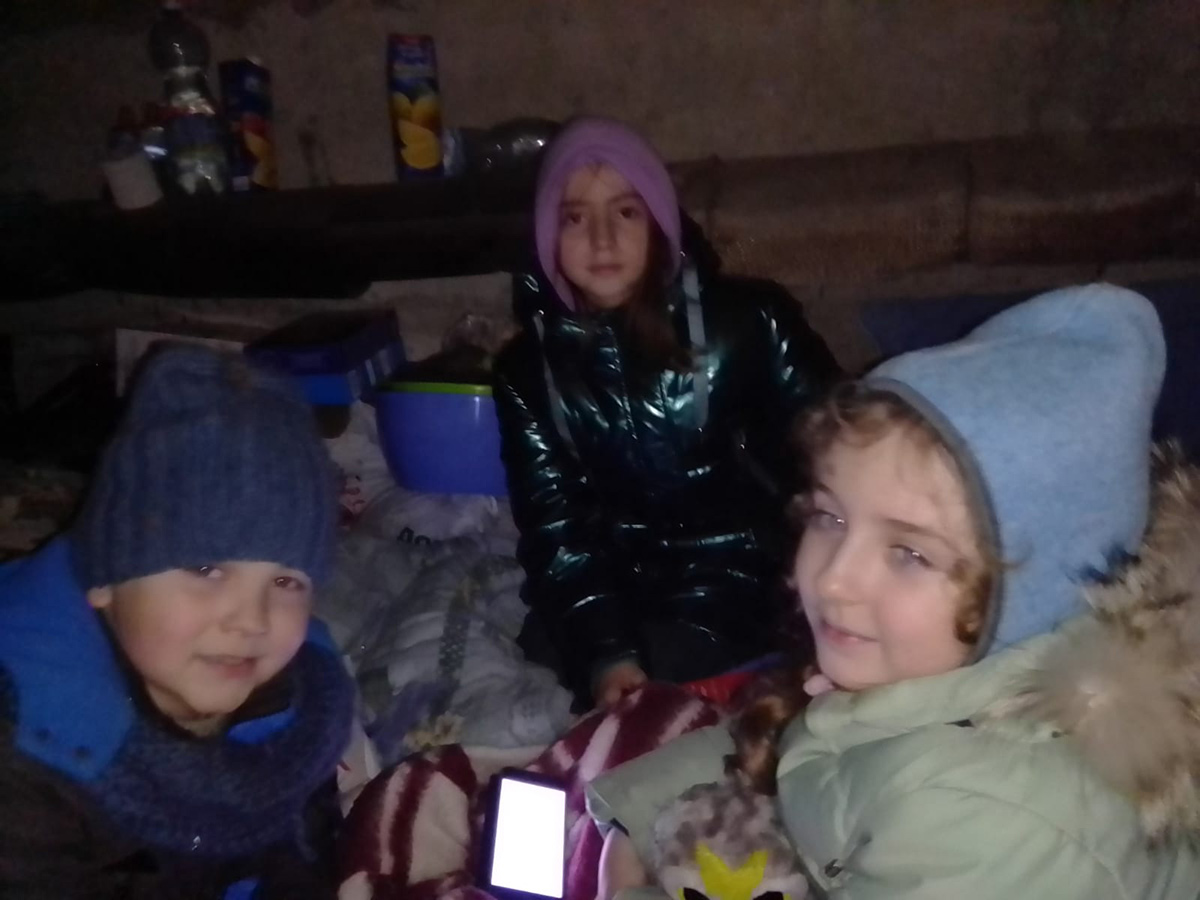 Children in a camp for deportees in Bezimenne. (Photo: Slidstvo.info)
Children in a camp for deportees in Bezimenne. (Photo: Slidstvo.info)
At the camps, deportees were forced to provide their passport information, fingerprints, and phone contacts. They were also interrogated about whether their friends or relatives had any military ties.
The inspections were carried out by local investigators, DNR police, and Russian border guards, who often duplicated functions and asked the same questions. The interrogations at the border were the most severe, refugees said.
Olena recalled how she struggled to clear her phone contacts of the word “Azov,” which could be construed as a reference to a Mariupol-based militant group with far-right links now incorporated into the Ukrainian national guard.
“We live on the Azov Sea, so all of our infrastructure begins with the word Azov: Azovye, Azovstal, the gas stations are called Azov. And they think that if a word has ‘Azov,’ that means you’re associated with the battalion and the ‘Nazis,’” she said.
During her second interrogation, she said she was asked how she felt about Russia’s “special operation,” the official Russian term for the invasion of Ukraine.
“I was afraid to give the wrong answer,” she said. “I thought, ‘What the hell kind of special operation? You bastards are attacking, you’re destroying our homes. Our schools. This was all ours! … We put so much money into our city in the last few years. We have new parks, new movie theaters, an ice skating center, swimming pools, fountains! You’re not going to see anything like that in your fucking Russia anytime soon. And you’re asking me how I feel about the special operation?’”
“All of this was in my head, all my emotions were coming to the fore. But I understood that I couldn’t do that. So I said I had no feelings about the special operation.”
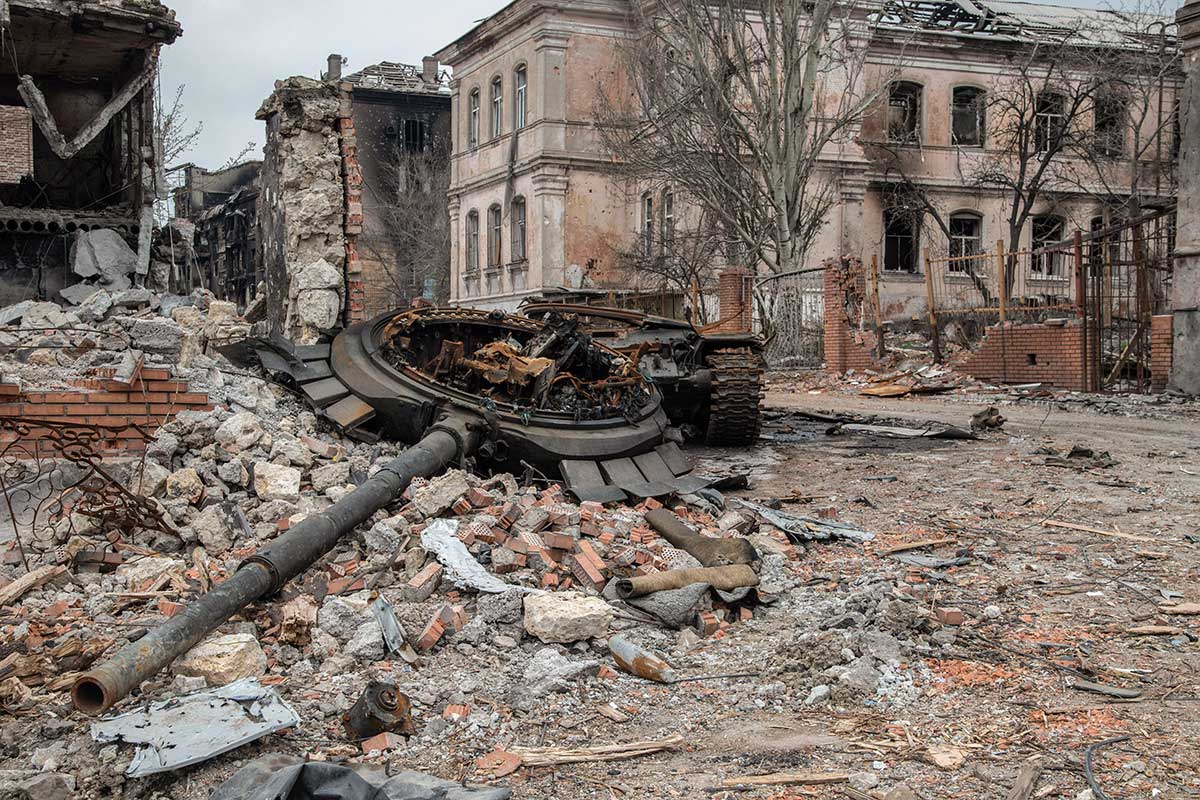 A destroyed tank in the center of Mariupol. (Photo: Maximilian Clarke / SOPA Images/Sipa USA)
A destroyed tank in the center of Mariupol. (Photo: Maximilian Clarke / SOPA Images/Sipa USA)
‘You’ve Washed, You’ve Eaten, You’re Free’
Those who passed the filtration were issued migration cards, placed on buses, and taken into Russia. For many, the first destination was the nearby city of Taganrog.
On arrival, some were herded onto trains that took them deeper into Russia, to destinations they hadn’t chosen. Others were placed in a temporary shelter where they could eat and wash up. But they couldn’t stay long: Those who refused to board the next available train were forced to leave their space and make their own arrangements.
“They said, ‘You’ve washed, you’ve eaten, you’re free,’” Olena said. “That is, they brought us to Taganrog and now you can go anywhere you want. … You have no money for food, or an apartment, and no one will shelter you.”
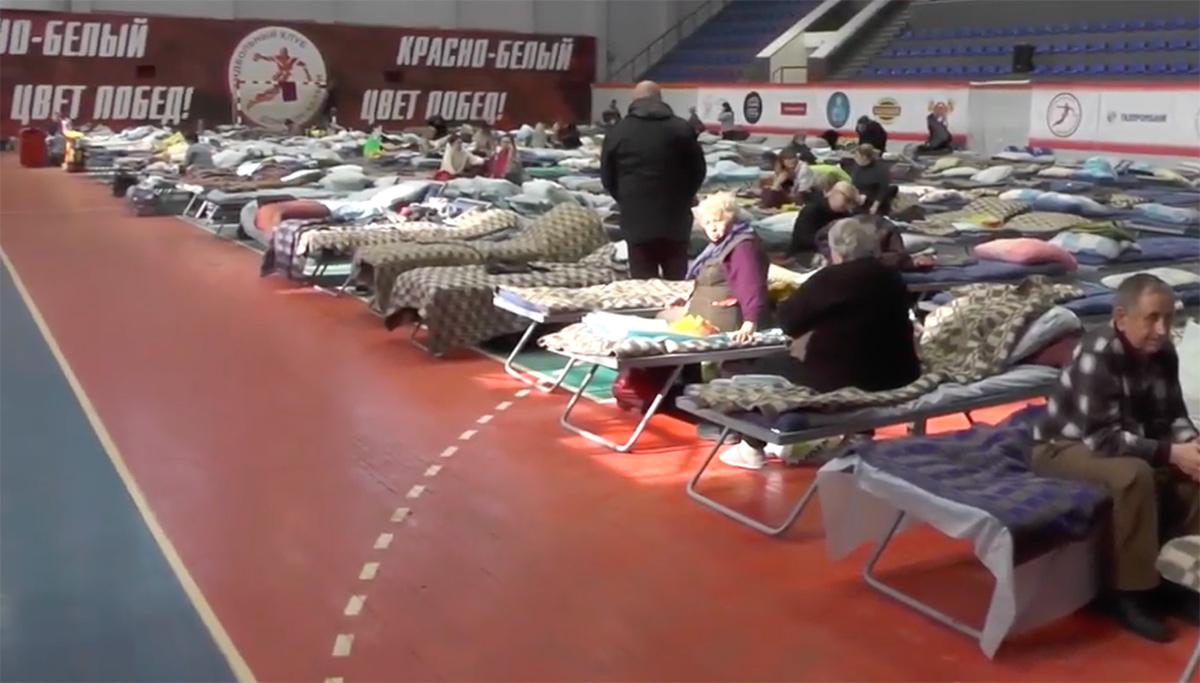 A temporary facility for Ukrainians in the Russian city of Taganrog. (Photo: Taganrog Administration)
A temporary facility for Ukrainians in the Russian city of Taganrog. (Photo: Taganrog Administration)
Those who had relatives in Russia tried to get in touch. Others tried to pick destinations as close to Europe as possible. Offered transport to a small city on the Volga river called Cheboksary, Lina and her family instead made their way to St. Petersburg.
But others, exhausted and out of options, decided to accept whatever they were offered. Vladyslav, the actor, ended up in a small village outside Tolyatti, a city on the Volga about 1,000 kilometers southeast of Moscow.
Olena and her family were taken on a train to Kazan, a city in the republic of Tatarstan.
“It was the Ministry of Emergency Situations that did the organization and transport. They met us, escorted us, so that no one would get lost,” she said. “They didn’t let us out at a single station. … You feel like a prisoner … and no one thought of disobeying, because we were accompanied by the Emergencies Ministry. They were armed.”
‘Humanitarian’ Help
Having traveled hundreds of kilometers into the country whose army had destroyed their homes, several refugees described feeling that they had now become the subjects of humanitarian propaganda.
Olena recalled how they were greeted by volunteers in brightly colored vests and television reporters when their train reached Kazan.
“They were showing how the volunteers and emergency workers were helping us carry our bags, taking old ladies by the arm. You know, like we’re sick, impoverished, and helpless. How Russia is helping us.”
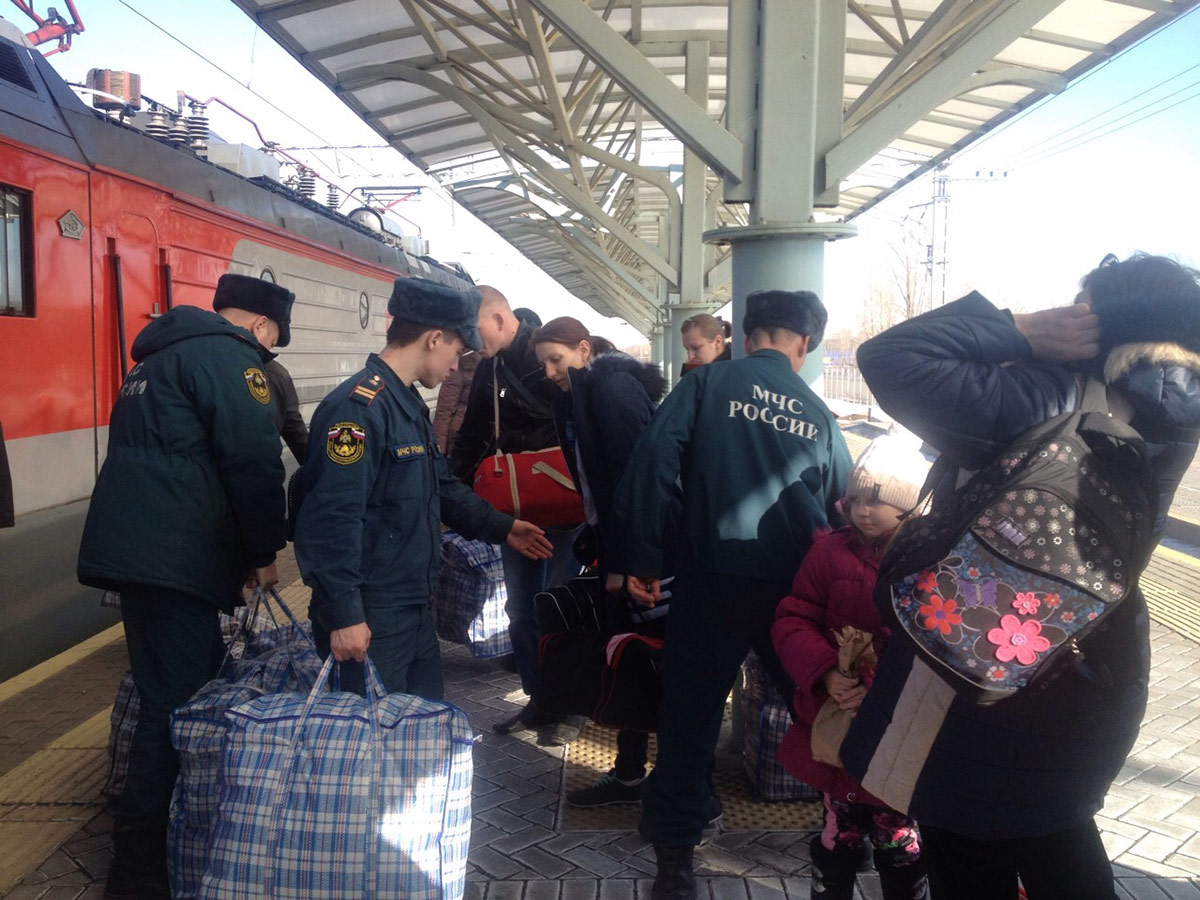 A photo released by the Kazan administration showing people from Ukraine arriving by train and being met by workers from Russia’s emergency ministry. (Photo: Kazan Administration)
A photo released by the Kazan administration showing people from Ukraine arriving by train and being met by workers from Russia’s emergency ministry. (Photo: Kazan Administration)
She and her family were settled in a Soviet-era hotel, exhausted from their ordeal. “For the first time in over a month we slept in beds,” she said.
But before long, she and her family were subject to a series of medical inspections and other official procedures carried out by workers from a variety of state agencies. They were made to fill out countless forms, providing the same information over and over, and pressed to register their children for school.
“They didn’t ask anyone, do you want this or not. And we weren’t in a condition to refuse,” she said.
Locals, who had heard about their arrivals on the news, brought them assistance like towels, underwear, and children’s supplies. But after her experience she could not bring herself to feel grateful.
“The people felt sorry for us, and that was the most disgusting thing of all. … The most disgusting thing was that they felt sorry for us, without understanding that it was their country that had destroyed us.”
Vladyslav, who had ended up in a children’s summer camp that had been transformed into a shelter, recalls being visited by representatives from factories who offered jobs, and from children’s rights services and universities to help enroll people in schools. But he was also subject to repeated interrogations, even when he became sick and was running a 104 degree fever. “‘No, get up and go,’” he says he was told.
Olena recalled being questioned by a police official: “The questions were phrased so that it was impossible to tell the truth. For example: ‘Do you have property that was damaged from the actions of the Ukrainian armed forces, National Guard, or armed battalions?’ … There were a million questions like that. ‘How did they force you to study the Ukrainian language?’ Absurd questions.”
Vladyslav recalls that all social services work was aimed at integrating the arrivals into Russian society as quickly as possible. “They had a great desire for everyone to become citizens of Russia,” he said.
According to activists who assist Ukrainian deportees in Russia, some received leaflets offering jobs and opportunities in the country’s far east.
But for many, the highest priority was finding a way to go in the other direction.
Russian Orthodox Church
As it turns out, an important role in the deportation and resettlement of Ukrainians is played by the Russian Orthodox Church, which is hosting some deportees in churches and monasteries.
In a previous investigation based on emails leaked from the church’s charity wing, Slidstvo.info found that the emergencies ministry has been sending daily information about resettled Ukrainians, along with train and bus schedules, to the church.
According to the official website of the Moscow Patriarchate, 52 dioceses are “assisting” deported Ukrainians. The conditions of their stay there are not known.
Escape to Europe
Yulia and two of her children were among those who made it from Russia to the European Union.
Though she is not from Mariupol — she lived in a Ukrainian-controlled town in the Luhansk region, not far from separatist territory — she described a similar experience of having her town captured and finding that going east to Russia was the only option.
With the help of an LNR fighter, Yulia said, she and her sons made their way to the Russian border and were put on a train that was taking hundreds of deportees to St. Petersburg.
She managed to hold onto her phone and speak with her adult daughter, who was still in Ukraine and was passing along advice from activists.
“She told me to somehow ‘lose’ the group. That is, I shouldn’t go to the sanatorium where they were being taken,” she said.
When the train arrived in St. Petersburg, she told a police chief that she was going to meet her relatives and gave him a fake address. An activist who met her at the station backed up the story.
The next day, her daughter had arranged for someone to take her to the Estonian border, where she underwent a final check.
“The Russians went through my things for a really long time. … I don’t know what they were looking for,” she said. “They called up my oldest son. … Then they interrogated Vanya, my five-year-old.”
Finally, she was allowed to leave the country.
Olena, too, managed to escape to Europe, eventually making her way to Latvia. Once in safety, she often thought of her grandmother, who she was forced to leave behind in Mariupol. She’d had no way of reaching her to tell her what was happening.
“She was left alone. Just one day we stopped coming to her. She didn’t know where we were,” she says. “When we were taken out, I got Internet [access] and got in touch with some friends. I asked them to go to her and to tell her that we didn’t leave her … that we had to leave against our will.”
“And just in the last few days, we got the news that she had died. She never got to see us again.”
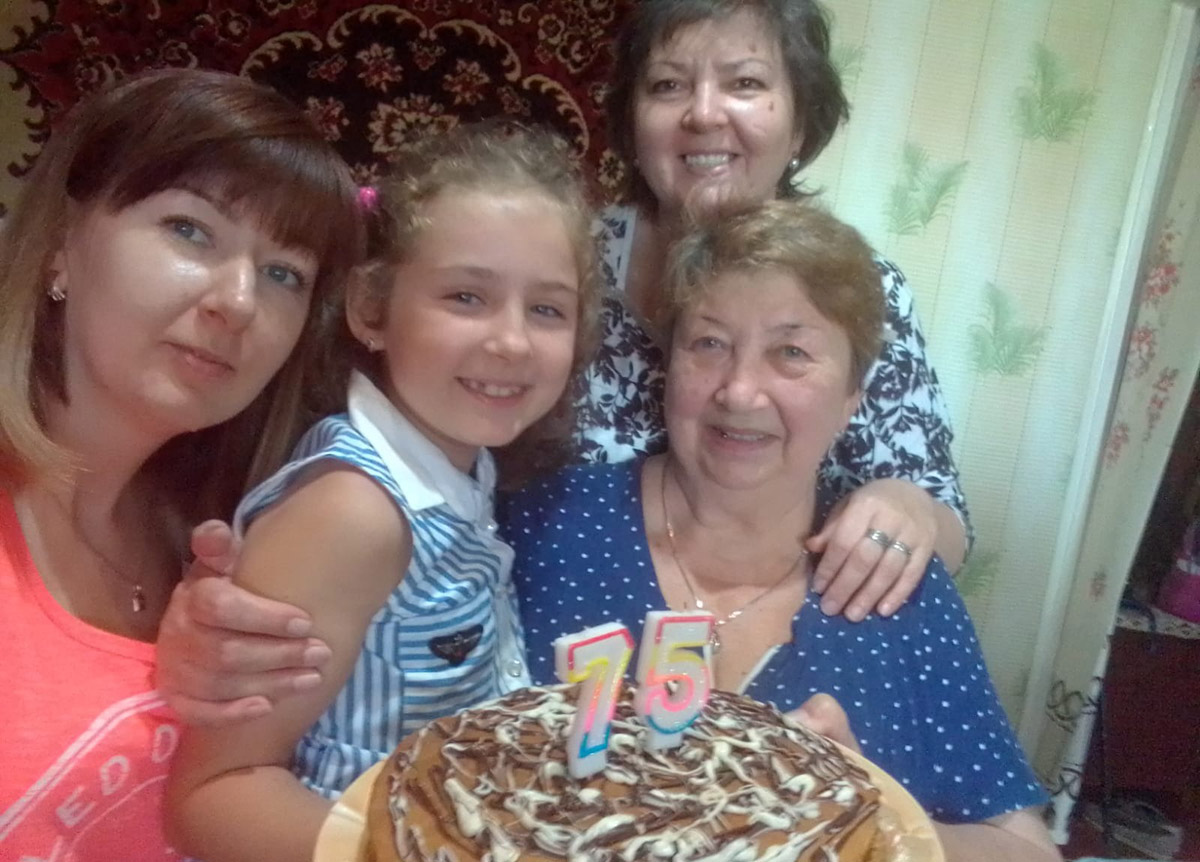 Olena’s last photo with her daughter, mother, and grandmother. (Photo: Slidstvo.info)
Olena’s last photo with her daughter, mother, and grandmother. (Photo: Slidstvo.info)
With additional reporting by Inga Springe (Re:Baltica).
